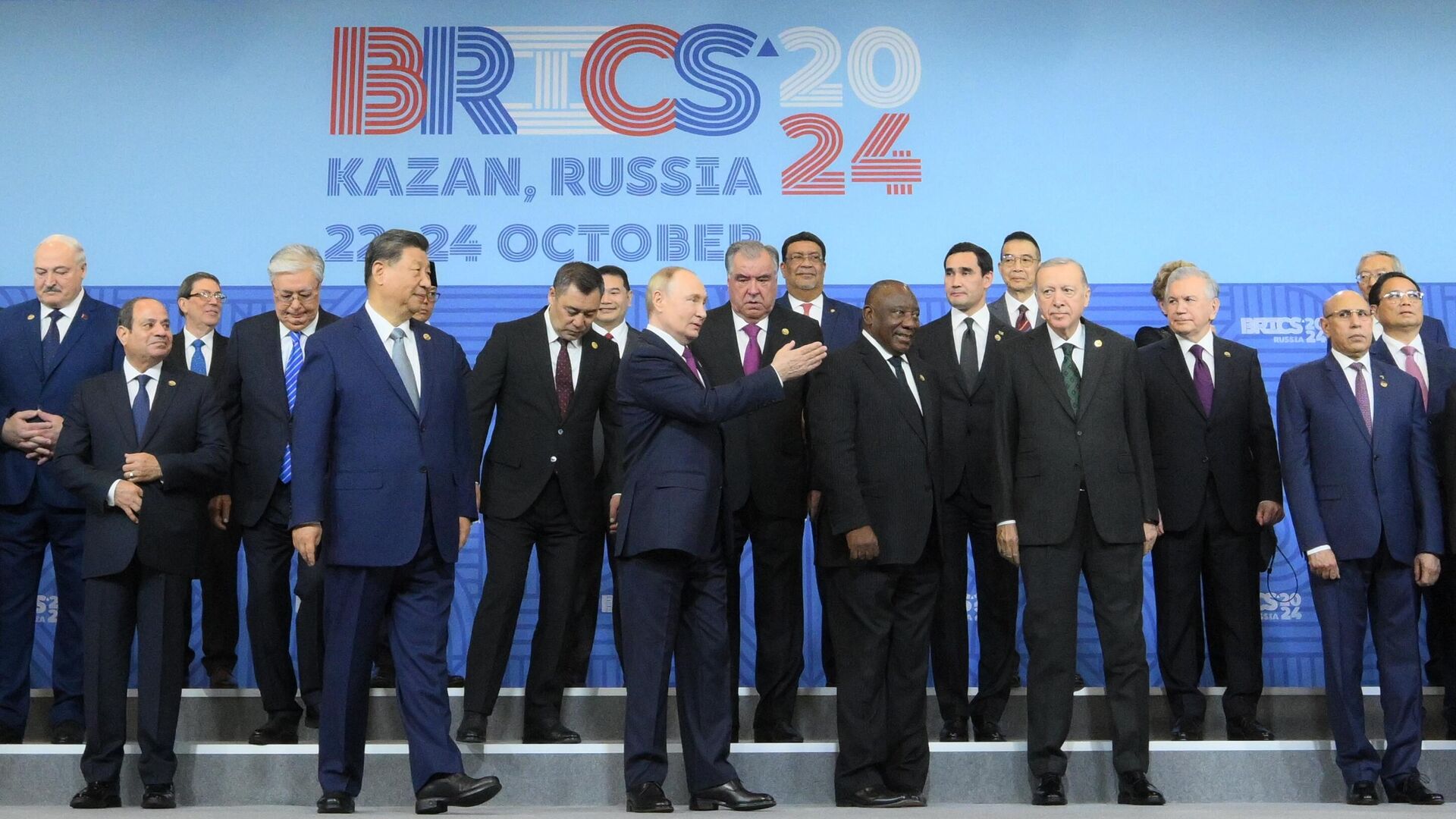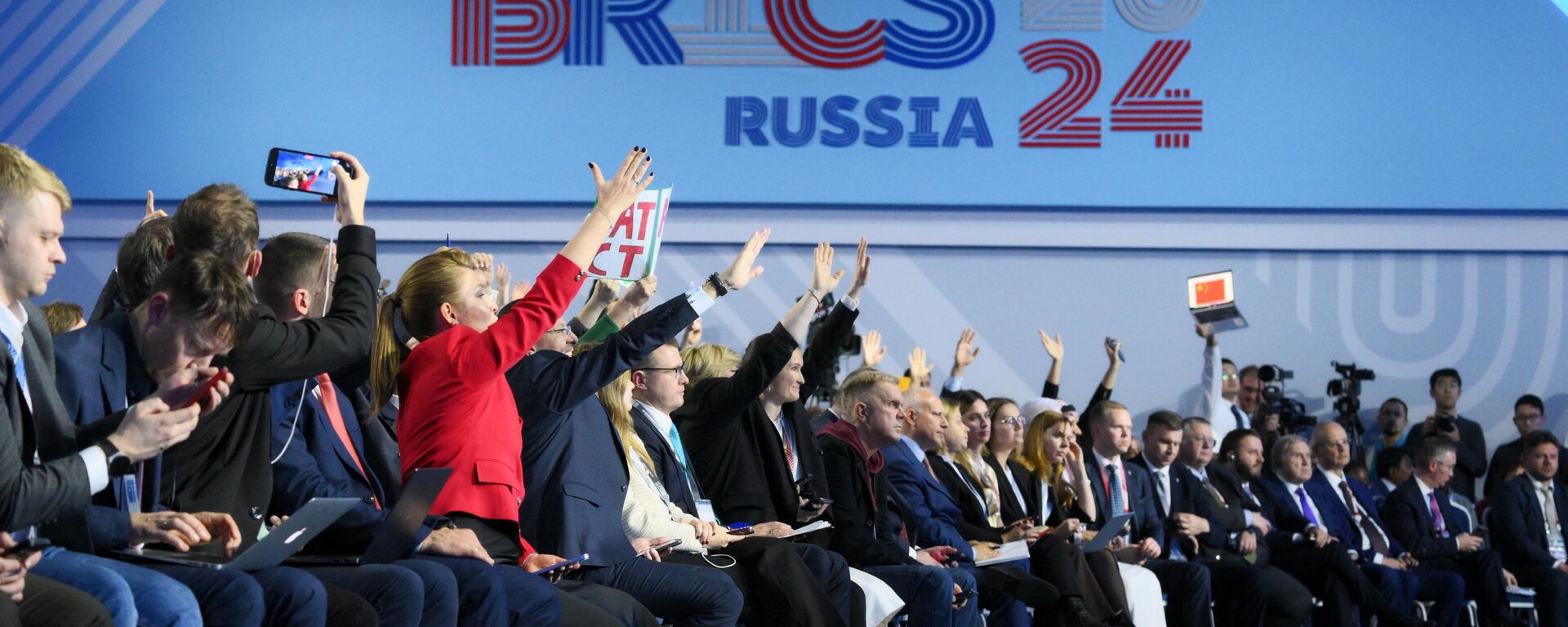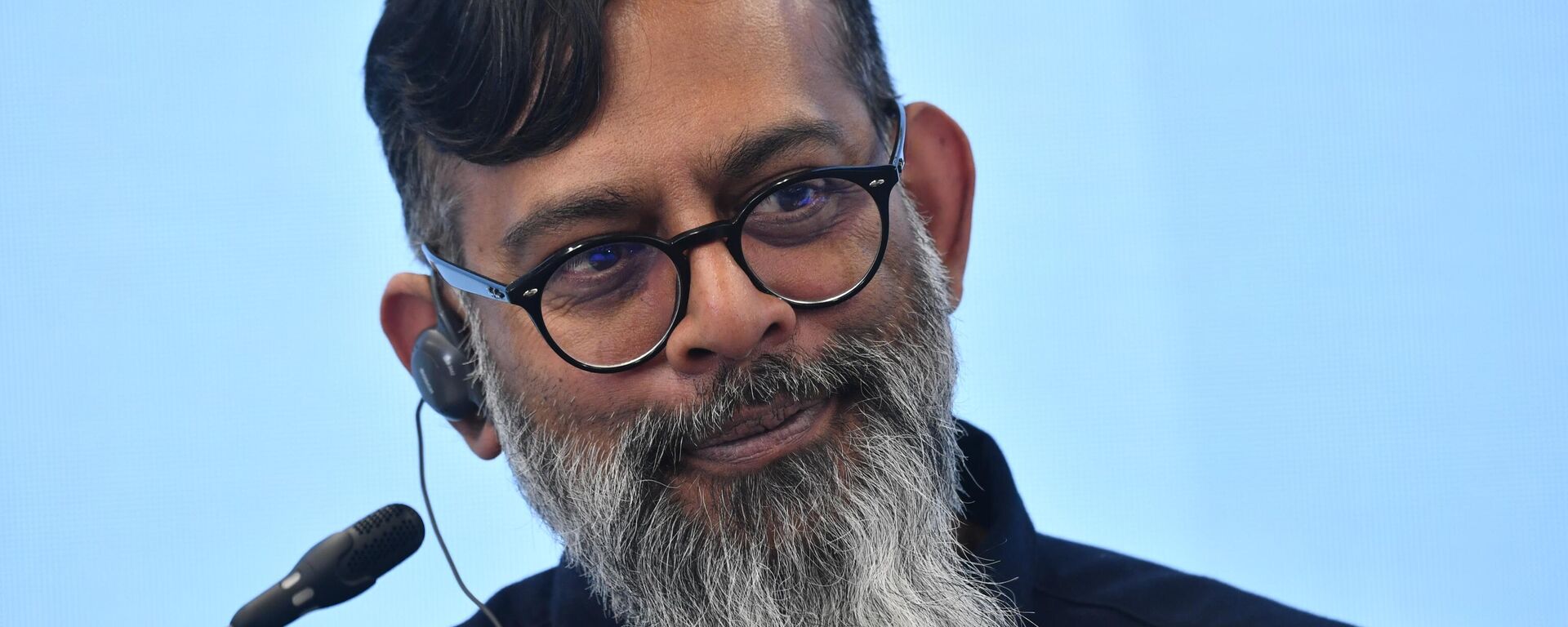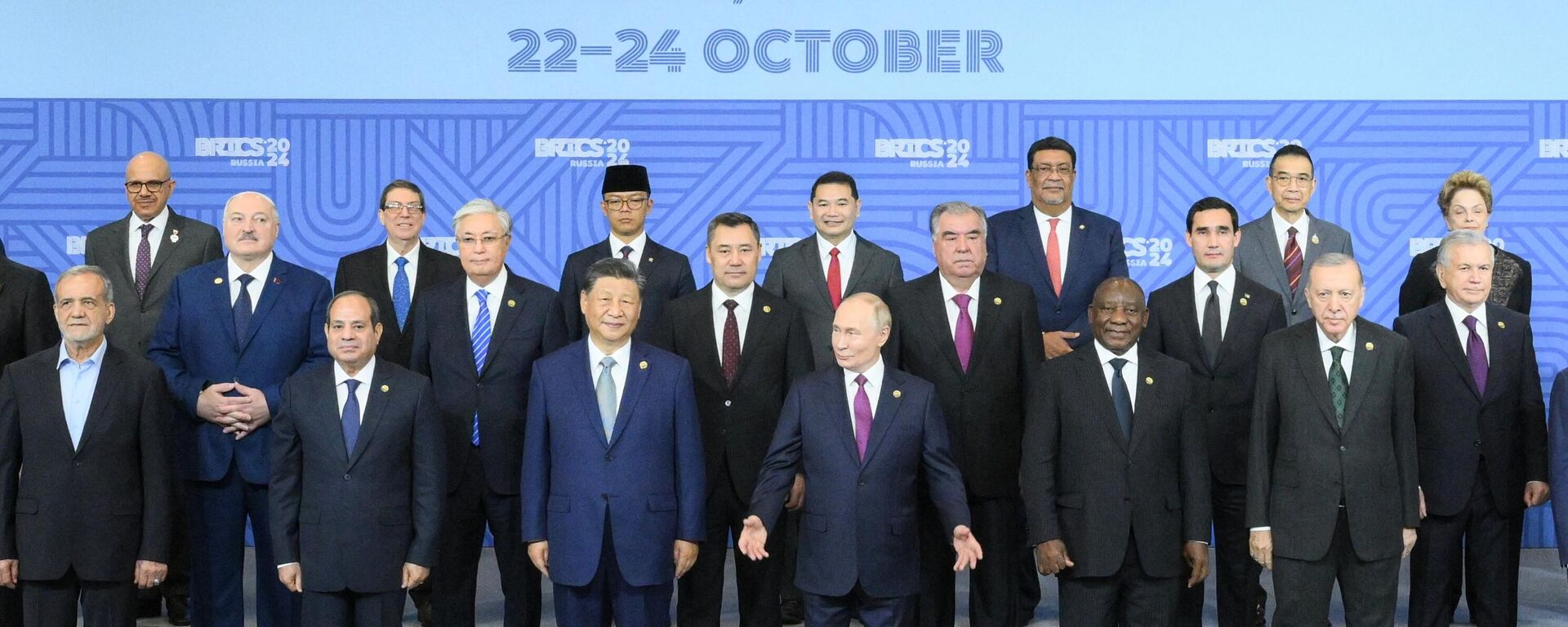https://en.sputniknews.africa/20241028/western-proposition-of-russias-isolation-is-attempt-to-maintain-dominance-says-egyptian-expert-1068917463.html
Western Proposition of Russia's Isolation is Attempt to Maintain Dominance, Says Egyptian Expert
Western Proposition of Russia's Isolation is Attempt to Maintain Dominance, Says Egyptian Expert
Sputnik Africa
The 16th BRICS Summit took place in Kazan, Russia, from October 22 to 24. This summit was particularly significant as it marked the first time Egypt, Ethiopia... 28.10.2024, Sputnik Africa
2024-10-28T15:22+0100
2024-10-28T15:22+0100
2024-10-28T16:40+0100
opinion
egypt
russia
brics
brics expansion
brics summit 2024
brics plus
brics summit
west
sanctions
https://cdn1.img.sputniknews.africa/img/07e8/0a/1c/1068917703_0:0:2905:1634_1920x0_80_0_0_dc7a58ca2e4da9707588ccf08e3e4f82.jpg
The recent BRICS Summit, held in Russia's Kazan, demonstrated the contrary of the West's claims of Russia's isolation, Dr. Haitham Omran, a Lecturer of Political Science and International Law at Suez University, Egypt, asserted in an interview with Sputnik Africa.He believes that the West's continued proposition of Russia's isolation reflects the manifestation of a broader strategy in dealing with geopolitical shifts and trying to maintain a dominant position.Dr. Omran also highlighted the Western strategy of influencing world public opinion by portraying Russia as isolated. "The aim of exerting this pressure is therefore to reduce international support for Russia and try to encourage other countries to distance themselves from it economically and politically," he said.The expert further emphasized the role of BRICS and other groupings with Russian participation, such as the Shanghai Cooperation Organization, as alternative frameworks to the Western-dominated global order.Egypt's BRICS Membership Strengthens Ties With RussiaDr. Omran believes that the North African country's participation in the 16th BRICS Summit as a full member for the first time marks a crucial step in deepening bilateral cooperation between Cairo and Moscow, especially in areas such as energy and agriculture.He emphasized the potential benefits for both countries, saying that cooperation between Egypt and Russia offers Egypt great opportunities, especially in areas such as energy and agriculture, as Egypt imports wheat from Russia. On the other hand, Russia can use this cooperation to search for new markets to offset the impact of Western sanctions.Dr. Omran also pointed to the potential for expanding collaboration in infrastructure and energy projects.BRICS Can Foster an 'Alternative Economic Network'Dr. Omran sees the BRICS summit as a catalyst for a more multipolar world, potentially accelerating economic growth within the bloc and offering Africa new partnerships.He emphasized the BRICS countries' unique approach to Africa, highlighting Russia’s unconditional policies in contrast to Western countries as a positive example.The expert also underscored that Russia's historical absence of colonialism in Africa makes it a more attractive partner for many African nations. "By contrast, Western countries as a whole basically mean the domination of African states, and therefore the vision of the colonizer is still present in the African mentality and always present with regard to Western-African relations," he said.He also believes that BRICS can contribute to stability in conflict-affected areas, further enhancing its attractiveness to African nations.Speaking on Egypt's participation in the summit as a member for the first time and the broader trend of African nations' willingness to join BRICS, Dr. Omran noted a growing global rejection of the current international order.
https://en.sputniknews.africa/20241027/despite-sanctions-everything-is-developing-in-russia-guinean-deputy-says--1068903967.html
https://en.sputniknews.africa/20241026/brics-offers-more-progressive-world-order-south-african-expert-says-1068900127.html
https://en.sputniknews.africa/20241027/brics-summit-nigerian-professor-gives-african-perspective-1068907236.html
egypt
russia
west
ukraine
middle east
north africa
Sputnik Africa
feedback@sputniknews.com
+74956456601
MIA „Rossiya Segodnya“
2024
Muhammad Nooh Osman
https://cdn1.img.sputniknews.africa/img/07e7/04/0a/1058467512_0:0:1280:1280_100x100_80_0_0_ec723833bcbfcaed2e21952965ad99e4.jpg
Muhammad Nooh Osman
https://cdn1.img.sputniknews.africa/img/07e7/04/0a/1058467512_0:0:1280:1280_100x100_80_0_0_ec723833bcbfcaed2e21952965ad99e4.jpg
News
en_EN
Sputnik Africa
feedback@sputniknews.com
+74956456601
MIA „Rossiya Segodnya“
Sputnik Africa
feedback@sputniknews.com
+74956456601
MIA „Rossiya Segodnya“
Muhammad Nooh Osman
https://cdn1.img.sputniknews.africa/img/07e7/04/0a/1058467512_0:0:1280:1280_100x100_80_0_0_ec723833bcbfcaed2e21952965ad99e4.jpg
egypt, russia, brics, brics expansion, brics summit 2024, brics plus, brics summit, west, sanctions, us sanctions, anti-russian sanctions, ukraine, ukraine crisis, russia-africa cooperation, cooperation, middle east, north africa
egypt, russia, brics, brics expansion, brics summit 2024, brics plus, brics summit, west, sanctions, us sanctions, anti-russian sanctions, ukraine, ukraine crisis, russia-africa cooperation, cooperation, middle east, north africa
Western Proposition of Russia's Isolation is Attempt to Maintain Dominance, Says Egyptian Expert
15:22 28.10.2024 (Updated: 16:40 28.10.2024) Muhammad Nooh Osman
Writer/Editor
The 16th BRICS Summit took place in Kazan, Russia, from October 22 to 24. This summit was particularly significant as it marked the first time Egypt, Ethiopia, Iran, and the UAE participated as members, following their accession in January.
The recent BRICS Summit, held in Russia's Kazan, demonstrated the contrary of the West's claims of Russia's isolation, Dr. Haitham Omran, a Lecturer of Political Science and International Law at Suez University, Egypt, asserted in an interview with Sputnik Africa.
He believes that the West's continued proposition of Russia's isolation reflects the manifestation of a broader strategy in dealing with geopolitical shifts and trying to maintain a dominant position.
"The continued talk of isolation of Russia aims to increase political and diplomatic pressure, and try to show that there is a kind of global consensus against Russian policies," the academician explained, noting that one of the reasons of the West's continued claims of Russia's isolation is the Ukrainian crisis.
Dr. Omran also highlighted the Western strategy of influencing world public opinion by
portraying Russia as isolated. "The aim of exerting this pressure is therefore to reduce international support for Russia and try to encourage other countries to distance themselves from it economically and politically," he said.
The expert further emphasized the role of BRICS and other groupings with Russian participation, such as the Shanghai Cooperation Organization, as alternative frameworks to the Western-dominated global order.
"Underestimating the importance [of platforms such as BRICS] in Western discourse comes from the standpoint of competing with those frameworks, and therefore portraying Russia as an isolated country serves the idea that participation in these frameworks does not give full legitimacy or international sympathy," he argued.
Egypt's BRICS Membership Strengthens Ties With Russia
Dr. Omran believes that the North African country's participation in the 16th BRICS Summit as a full member for the first time marks a crucial step in deepening bilateral cooperation between Cairo and Moscow, especially in areas such as energy and agriculture.
"[Egyptian President Abdel Fattah] el-Sisi's statements on BRICS' achievements in trade, especially between Egypt and Russia, reflect the deepening of the economic partnership between the two countries despite increasing global pressures such as Western sanctions on Russia and geopolitical disputes," Dr. Omran told Sputnik Africa.
He emphasized the potential benefits for both countries, saying that cooperation between Egypt and Russia offers Egypt great opportunities, especially in areas such as energy and agriculture, as Egypt imports wheat from Russia. On the other hand, Russia can use this cooperation to search for new markets to offset the impact of Western sanctions.
Dr. Omran also pointed to the potential for expanding collaboration in infrastructure and energy projects.
"Cooperation here may not only be limited to Egypt and Russia but could encourage other BRICS countries to expand their trade ties with the two countries. This will reinforce Egypt's importance as a bridge for cooperation between Russia and Middle Eastern countries," added the Egyptian academician.
BRICS Can Foster an 'Alternative Economic Network'
Dr. Omran sees the BRICS summit as a catalyst for a more multipolar world, potentially accelerating economic growth within the bloc and
offering Africa new partnerships.
He emphasized the BRICS countries' unique approach to Africa, highlighting Russia’s unconditional policies in contrast to Western countries as a positive example.
"Russia, for example, provides aid and investment without human rights or governance conditions, thus making it a preferred partner for many African countries that may feel pressured or pressured by Western conditions," Dr. Omran said.
The expert also underscored that Russia's historical
absence of colonialism in Africa makes it a more attractive partner for many African nations.
"By contrast, Western countries as a whole basically mean the domination of African states, and therefore the vision of the colonizer is still present in the African mentality and always present with regard to Western-African relations," he said.
He also believes that BRICS can contribute to stability in conflict-affected areas, further enhancing its attractiveness to African nations.
Speaking on Egypt's participation in the summit as a member for the first time and the broader trend of African nations' willingness to join BRICS, Dr. Omran noted a growing global rejection of the current international order.
"Countries of the world are basically starting to reject the existence of an international power or units that control the destinies of countries in one way or another politically and economically," he said, adding that many countries no longer view the current international system as effective, as evidenced by its failure to address numerous political, economic, and military crises.





